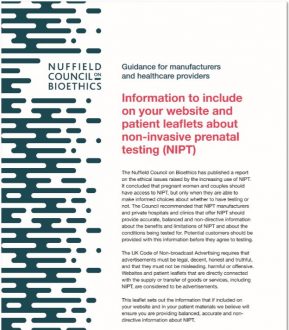22 Jun 2021
News
Guidance on information that should be provided to patients about NIPT
The Nuffield Council on Bioethics has produced a guidance leaflet for private providers of non-invasive prenatal testing (NIPT) on the information they should include on their websites and patient leaflets about NIPT.
In its recent report on the ethics of NIPT, the Council recommends that NIPT manufacturers and private hospitals and clinics that offer NIPT to women and couples should provide accurate, balanced and non-directive information about the benefits and limitations of NIPT, and about the conditions being tested for. Potential customers should be provided with this information to enable them to make informed choices about whether to have testing or not.
The Council found that some NIPT providers operating in the UK are not meeting their obligations in this regard.The leaflet covers the essential information to include, such as information on test performance, the possibility of a failed test, follow-up diagnostic testing, and the genetic conditions being tested for, such as Down’s syndrome. The information should be provided in an accessible, jargon-free way and providers should be careful not to use offensive language.

The leaflet suggests that as a matter of good practice NIPT providers should give information on the possible implications of testing, on the counselling and diagnostic testing services available, and on the possibility of secondary findings about the pregnant woman.
The Council encourages NIPT providers to join NHS England’s free Information Standard scheme, which would demonstrate their commitment to providing trustworthy health information.
“NIPT can offer pregnant women and couples information about their fetus early in pregnancy and without the risk of miscarriage,” said Hugh Whittall, Director of the Nuffield Council on Bioethics. “But those seeking NIPT in the private sector are often confronted by incomplete or misleading information at what is often an anxious time. This is unacceptable and we must see change within the sector.”
The UK Code of Non-broadcast Advertising requires that advertisements must be legal, decent, honest and truthful, and that they must not be misleading, harmful or offensive. Websites and patient leaflets that are directly connected with the supply or transfer of goods or services, including NIPT, are considered to be advertisements.
The leaflet has been distributed to NIPT providers operating in the UK.Guidance for manufacturers and healthcare providers: Information to include on your website and patient leaflets about non-invasive prenatal testing (NIPT)

Share